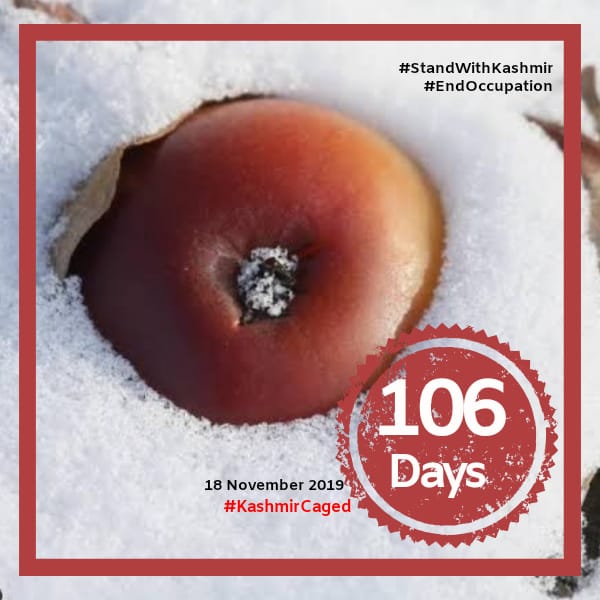NEW DELHI, India: A seven-member delegation from All India Kisan Sangharsh Coordination Committee (AIKSCC), a nationwide platform of 250 farmers’ organisations, visited Kashmir valley to take stock of the situation of the apple growers and farmers in the J&K state after August 5, 2019 when the Indian government decided to abrogate Articles 370 and 35A of the Indian Constitution and partition the erstwhile state of Jammu & Kashmir (read as Indian Occupied Kashmir).
The delegation visited different areas in the Kashmir Valley for three days and has come out with a detailed assessment of the ground situation of the farmers, who along with the rest of the people are suffering under the complete lockdown, but additionally are bearing the brutal brunt of the complete loss of crop due to natural calamity in the form of early and heavy snowfall in the Valley.
The AIKSCC team in a press release on November 16 demanded that the unseasonal, heavy snowfall in the Kashmir valley must be declared a ‘National Calamity’ and farmers must be adequately compensated for the losses suffered due to natural disaster as well as the lack of transport and cold storage assistance due to the situation in Jammu and Kashmir since August 5. They noted that no special care was provided by the Indian government to the farmers in the conflict region to procure, harvest or transport their produces like apple, saffron, etc.
After holding official meetings with representatives of Fruit Growers’ Associations from all districts of Kashmir and The Kashmir Chamber of Commerce and Industry, the Delegation held a public hearing with local farmers at Kulgam. They also visited farmers from Ganderbal, Pampore, Pulwama, Kulgam and Anantanag. The lack of proper transportation and communication facilities, irregular supply of electricity and its impact on the procurement market have impacted all stakeholders in the fruit production sector, which has made it impossible to harvest and store the fruits in cold storage, on time. The crisis has also impacted saffron crop and also the sheep breeders due to the reduction in sale of goats and sheep.
Kashmir caters to 75% of the total apple production in the country and the horticulture industry of Kashmir has a turnover of Rs 10,000 crore annually. As per reports, there has been a 70% loss, which will impact the livelihood of the people of Kashmir for several years to come. Farmers who attended the meetings with AIKSCC Delegation have expressed their concern that if not assisted by the authorities, peasant suicides may happen in the valley due to economic hardship, for the first time in history.
Under these circumstances, AIKSCC has demanded that the Indian government should:
- Declare untimely heavy snowfall in Kashmir valley a National Calamity and order urgent comprehensive field survey to assess extent of damage & actual loss
- Compensate the farmers from the NDRF for damage payment as well as compensatory relief
- Write off the loans of affected farmers and in the meanwhile reschedule KCC loans/extend long term interest free loan to all Apple and other Fruit growers
The farmers’ delegation from mainland to the conflict torn J&K is a pioneering and powerful gesture from the largest alliance of farmers’ organisations in the country, since independence. In 2017-18, the farmers’ agitation led by All India Kisan Sabha has created history by holding the long march of farmers. By taking up the struggle of Kashmiri farmers, the AIKSCC has challenged the singular narrative that is being provided to the country about Kashmir by the Modi government. It has also opened pathways for new sectoral alliances between the people of mainland India and Jammu & Kashmir, to fight the tyranny of the Indian state against the people of J&K.




